- TOP
-
ESG
- Social Report
- Ensuring a Safe, Civilized Work Environment
Ensuring a Safe, Civilized Work Environment
Development of Human Resources
Recognizing that human resources are its greatest asset, the Group provides employees with appropriate capability-developing opportunities and supports employee self-development, in line with each individual’s career and the organization’s goals.
Diversity Promotion
Promoting Female Participation
Dentsu helps develop and support the careers of female employees. To maximize the Company’s strength, we formulated an action plan for the promotion of diversity to run from January 1, 2015 until December 31, 2019. Through the plan, Dentsu is striving to expand its existing female-friendly work environments so that female participation in the workplace might increase.
Summary of the Action Plan
Goals
- Increase the ratio of women among new graduate recruits (permanent employees) to at least 35% by 2020.
- Increase the ratio of women among managers to at least 10% by 2020.
Specific efforts
- Adopt measures to recruit and select female employees.
- Enhance management skills of managers.
- Foster career awareness among female employees.
- Dispel uncertainty over work–family balance (raising children, providing care) by revising current systems and support measures.
- Redesign work style to encourage greater output, reduce long working hours.
Summary of the Action Plan ➡ https://www.dentsu.com/csr/workingenvironment/workplaceenvironment.html
In FY2013, we launched the Female Employees Promotion Project, to create a working environment in which temporary leaves of absence will not jeopardize employees’ careers. In addition, at an early stage of their careers, women are given ample opportunities to think about their careers at, for example, lunch meetings with senior female employees. This gives them the chance to hear about the experiences of others, and to attend career seminars held by lecturers invited from outside the Company.
Employing People with Disabilities
As part of its efforts to promote the employment of people with disabilities, in April 2013 the Company established Dentsu Solari, a wholly owned Group company that was designated as a special-purpose subsidiary in November of that year. The employment rate of people with disabilities at three Group companies (Dentsu, Dentsu Works, and Dentsu Solari) is 2.14% (as of 1st of June, 2018). The Company also employs people with disabilities in account management, as well as in creative and other areas. Along with Dentsu Solari, we are trying to expand their employment opportunities.
Working Environment Reforms
Our Working Environment Reforms Commission, in seeking to improve the Group-wide working environment in Japan, announced our Working Environment Reform Plan in July, 2017.
The reforms comprise four stages: Commitment, Target Setting, Challenge Identification, and Attaining the Goal. Currently, we are implementing various improvements and reforms, involving from in-house facilities and environments to work processes. Recognizing that employees with healthy minds and bodies are the foundation of management, we aim to foster the self-actualization of each employee while reducing working hours and increasing operational quality. In 2017, the pillars of reform were comprehensive labor management, enhanced worker protection, review of workflows through job inventories, and smart work styles. As a result, we are implementing reforms that cover labor management, business processes, internal infrastructure, the office environment, personnel evaluations, and health management systems.
Through the resultant changes, we will fundamentally alter the work style of Dentsu employees and implement reforms to create a new Dentsu.
With regard to the progress of our reforms, the Independent Advisory Committee for Labor Environmental Reform Activities, comprising outside experts, is engaged in ongoing monitoring of our efforts.
Working Environment Reform Plan
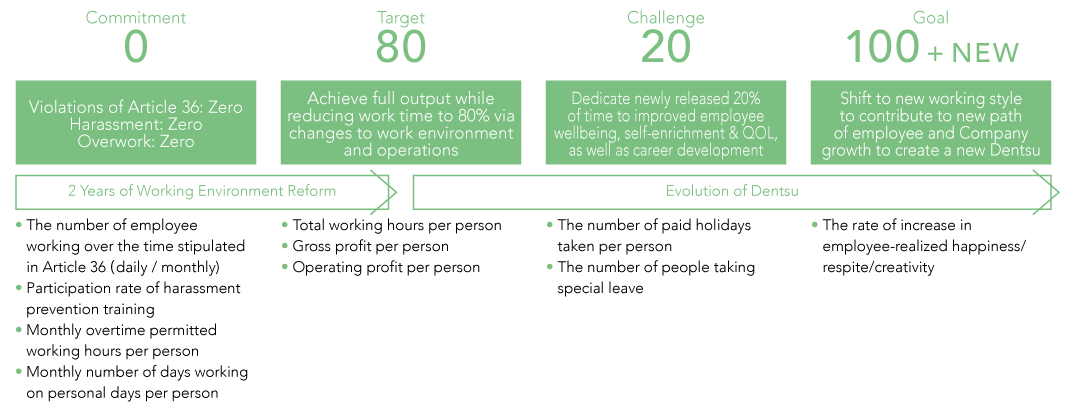
Working Environment Reform Plan, Monitoring Framework
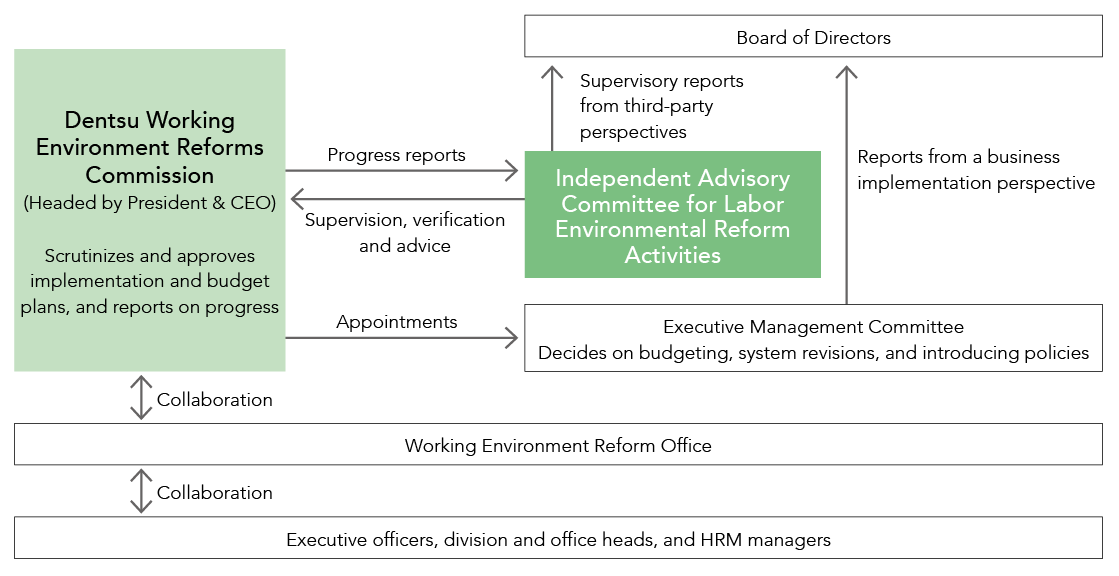
Measures developed and implemented in 2017
- Reinforcement of regulatory knowledge and insights
- Trained all employees in labor laws and regulations and prevention of harassment, and tested their comprehension
- Reduced actual working hours by lowering the upper limit of overtime and ensuring strict compliance with Article 36
- Established the “Independent Advisory Committee for Labor Environment Reform Activities” in February 2017, inviting outside experts to provide advice, management, and verification for the progress of the reform activities
- Improvement and reinforcement of employee management
- Introduced a Time Management Dashboard to visualize employees’ current working situation
- Appointed executive directors exclusively in charge of human resources management in each division
- Prohibited employees from remaining in office after work for personal reasons
- Checked on individual employees whose overtime work hours were near the maximum for several consecutive months
- Enforced lights-out hours between 10pm and 5am and prohibited work, including overtime work at home
- Provided extra protection to new employees by applying stricter working-hour guidelines than the statutory limit to reduce workload
- Held a “Day for thinking over a New Work Style” in which employees participated during “Death from Overwork Awareness Month” sponsored by the Ministry of Health, Labor, and Welfare.
- Reallocation of personnel and leveling of workload
- Reallocated personnel based on the calculation of optimum workload level
- Immediately increased staffing levels
- Conducted a thorough review of workflows, driving “Work-Diet” and outsourcing
- Introduced RPA to 400 workflows (to be expanded further)
Added “Compliance with legal and societal rules” and “work efficiency” to evaluation metrics - Established a discussion board with vendors to review workflow. Keeping employees motivated
- Improvement of office environment and work efficiency
- Improved work efficiency through technology making our internal application processes paperless
- Promoted a teleworking system by providing laptops and smartphones to all employees and upgrading applications
- Redesigned work areas to create an open space to encourage more face-to-face communications among employees
- Opened satellite offices in 20 locations nationwide
- Improved our meeting environment by managing daily schedules with Outlook, providing TV monitors in meeting rooms, and use of Skype, etc.
- Better services to maintain employees’ health and support family care
- Assigned mental health professionals on-site all times at the Company’s in-house health mana gement center to counsel employees as needed
- Established “Family Line” through which employees’ families can directly talk about employees’ physical and mental health
- Upgraded consultation service for new employees to handle their concerns about work, career, and mental health
- Introduced rest-interval system on a trial basis
- Encouraged employees to take more paid holidays and investigated a new holiday system
- Enhanced nursing care and childcare services
- More diverse working style alternatives
- Increased the number of departments offering flextime
- Introduced a work-from-home system on a trial basis
- Added a new employee-evaluation metric, “medium-term goal for self-improvement and career development,” for non-managers
- Reviewed our employee evaluation system to strengthen leadership capability
- Conducted 360-degree evaluation and aptitude tests for line managers
- Revised evaluation metrics for managers to emphasize medium-term contributions
- Defined “Development of team members” and “Proper management of work volume” as key evaluation criteria
- Keeping employees motivated
- Fully compensated employees for any reduction in overtime pay from previous year through an increase in bonus
-
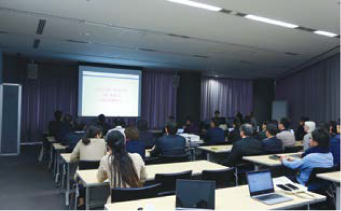
Compliance training
-
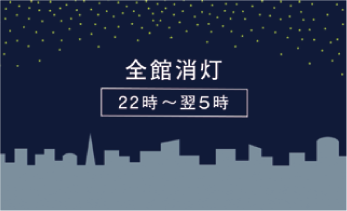
Enforced lights-out hours between
10pm and 5am -
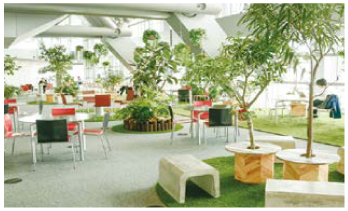
Refurbishing open workplace
2017 Achievements
Reduced the hours worked per person by more than 100 hours.
The total amount of time worked by employees (including managers) in 2017 was down 135 hours year on year to 2,031 hours. This was lower than the 2,100-hour 2017 target announced in our Basic Plan.
No employees exceeded the Article 36 rule
Following the January 2017 transition to the management of overtime in excess of statutory working hours, only one employee exceeded the Article 36 rule in March. Since April, no employee has exceeded the rule.
Improved employee paid leave utilization rate
The employee rate of paid leave utilization in 2017 was 64.0%, an improvement of 8 points compared with the 56.0% rate for the previous year.
Based on the goal of, by the end of 2017, having RPA—software with artificial intelligence and machine learning capabilities— account for 12,000 hours of high-volume, repetitive work that previously required humans to perform, December that year saw some 400 work processes automated, accounting for some 12,000 work hours per month.
Costs relating to the working environment reforms
In terms of costs incurred related to work environment reforms, we spent ¥1.3 billion for an urgent increase in employees; ¥4.0 billion for operational efficiencies, including the introduction of IT, RPA, and ICT for inhouse work inventories, policies such as outsourcing, and labor management; and ¥1.7 billion for office environment improvements, amounting to a total of ¥7.0 billion.
In 2018, we plan to invest a total of ¥13.0 billion, broken down into ¥8.0 billion for promoting the creation of a foundation for future growth through the acceleration of various measures and work environment reforms; ¥2.5 billion for office environment improvements; and ¥2.5 billion for the hiring of additional employees.
Three key programs started from 2018:
1. Trial introduction of "Input Holiday"— a monthly no-work day to encourage employees to take "input" for their "output"
An "Input Holiday", a monthly company-wide no-work day, has started from June 2018 on a trial basis. This is outside the statutory-based paid holidays and is set on a Wednesday or Friday of the second or third week of every month.
Employees are encouraged to take in "input" that is considered to have a positive influence on their "output," including doing something beneficial for their health or spending time on selfdevelopment. The Company aims to promote a notion that healthy employees with adequate rest is good for employees themselves, their families, our clients, and Dentsu. We will continue to study the effectiveness of holiday programs, including this one, to develop the most appropriate holiday system.
2. Introduction of "Vitality Note"— a tool to visualize employees' everyday condition
"Vitality Note," an automatic health-check tool, has been fully launched throughout the Company from July 2018. Employees receive objective analysis of their health conditions by instinctively answering a question that pops up automatically each day they first log on to their office PCs. It has been introduced on a trial basis since this April.
The "Vitality Note" system has been internally developed based on five metrics (PERMA) used in the field of positive psychology, an advanced study that helps people to attain their well-being. The system is beneficial to both employees and management because employees can learn their health conditions and managers can grasp the condition of an entire team, leading to the creation of a healthier work environment.
3. Learning opportunity of more than 100 hours a year per employee to help them grow
We have been developing various training programs for employees who have different capabilities and career plans based on our philosophy of emphasizing "employees' growth is the source of the Company's growth." To further our effort, we will develop programs that focus on the growth of individual employees.
We are currently developing a wide variety of programs with bold ideas and a scale never seen before. The programs have been gradually implemented from October, aiming to offer more than 100 hours over one year of learning opportunity per employee.
Other programs to be implemented:
- CoE (Center of Excellence) Services: Helping employees focus on core operations by freeing them from non-core operations and allocating them to specialists
- Digitalization of work flow: Comprehensive management of on-going jobs utilizing a cloud system
- Work-from-home, flextime, and rest interval systems
- Additional improvement of office environment (including IT)
- Review of HR systems
Going forward, we will continue to execute our reform programs steadily, focusing on full compliance with labor regulations, the reduction of long working hours, and the physical and mental health of our employees.
